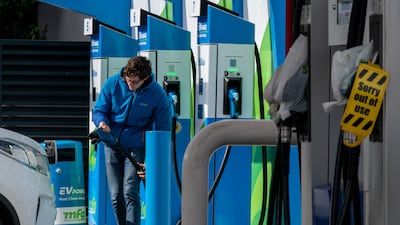Rishi Sunak is poised to announce a forced transition to electric vehicles in the coming weeks despite pressure from Conservative MPs to water down net zero plans, according to a report.
The Prime Minister has in the past sidestepped discussions in Parliament over the 2030 ban on the sale of diesel and petrol cars.
Now, he looks set to stick to his green plans in a bid to be seen as a climate-championing leader on the world stage.
The Prime Minister is refusing to budge on the 2030 target and also remains committed to tough interim targets for EVs, according to The Times. The rules could require most new cars to be electric within about five years.
The Sunak administration is understood to have promised BMW the 2030 target would not be relaxed as part of discussions to secure a £600 million investment to build electric Minis in Oxford rather than China.
The German manufacturer received £75 million in taxpayer support from minister as part of the deal.
BMW said the production of next-generation electric Minis would start in 2026 and they would also be made in China.

A spokeswoman for the Department for Transport said: “We’re engaging closely and constructively with industry as it works towards phasing out the sale of new petrol and diesel cars.”
A move to force a societal transition to EVs will go down well with environmental campaigners and groups but undoubtedly leave a sour taste with Tory backbenchers.
The ruling party will be concerned that going forward on green plans at a fast pace will be seen as out of touch with voters’ needs and cause it to suffer at the ballot box.
Labour Mayor Sadiq Khan’s controversial green Ulez (ultra low emission zone) scheme was blamed for Labour’s inability to wrestle Boris Johnson’s old constituency from the Tories in a recent by-election.
The Conservatives won the Uxbridge and South Ruislip seat after their candidate campaigned heavily against Ulez, which was expanded to encompass the whole of London at the end of August.
Under the scheme drivers of vehicles classed as high-polluting incur a daily charge of £12.50 to drive on London roads.
Labour leader Sir Keir Starmer concluded that “Ulez was the reason we didn’t win” in the by-election and said his party needed to reflect on that.
Lord David Frost, a former Brexit negotiator, said the Tories’ success in Uxbridge meant the party should push back on net zero commitments.
“The lesson is surely that green policies are very unpopular when there’s a direct cost to people – as indeed all the polling says,” he wrote on X, formerly Twitter. “This time that hit Labour. But soon it could be us unless we rethink heat pumps and the 2030 electric car deadline.”
Senior Tory MP and former business secretary Jacob Rees-Mogg, another critic of net zero, warned the lesson from Uxbridge was “high-cost green policies are not popular”. He called for the Conservatives to push back deadlines on phasing out petrol and diesel vehicles.
But Mr Sunak is understood to take the view that watering down his green agenda to please voters would damage the car manufacturing industry, which is largely embracing the shift to EVs.


